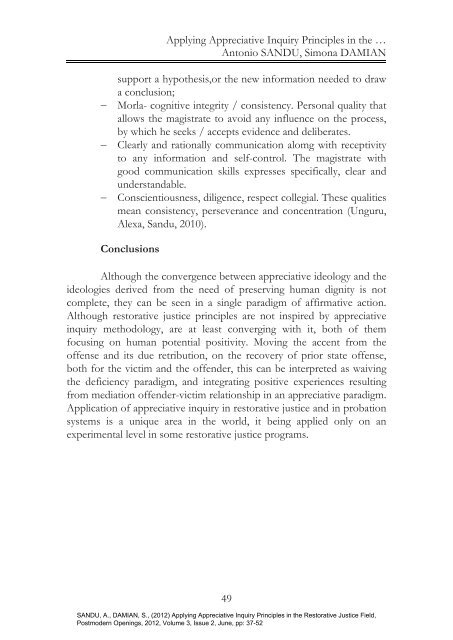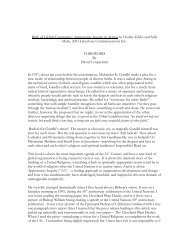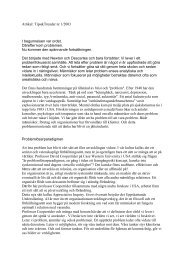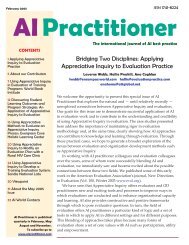Applying Appreciative Inquiry Principles in the Restorative Justice ...
Applying Appreciative Inquiry Principles in the Restorative Justice ...
Applying Appreciative Inquiry Principles in the Restorative Justice ...
Create successful ePaper yourself
Turn your PDF publications into a flip-book with our unique Google optimized e-Paper software.
<strong>Apply<strong>in</strong>g</strong> <strong>Appreciative</strong> <strong>Inquiry</strong> <strong>Pr<strong>in</strong>ciples</strong> <strong>in</strong> <strong>the</strong> …<br />
Antonio SANDU, Simona DAMIAN<br />
support a hypo<strong>the</strong>sis,or <strong>the</strong> new <strong>in</strong>formation needed to draw<br />
a conclusion;<br />
Morla- cognitive <strong>in</strong>tegrity / consistency. Personal quality that<br />
allows <strong>the</strong> magistrate to avoid any <strong>in</strong>fluence on <strong>the</strong> process,<br />
by which he seeks / accepts evidence and deliberates.<br />
Clearly and rationally communication alomg with receptivity<br />
to any <strong>in</strong>formation and self-control. The magistrate with<br />
good communication skills expresses specifically, clear and<br />
understandable.<br />
Conscientiousness, diligence, respect collegial. These qualities<br />
mean consistency, perseverance and concentration (Unguru,<br />
Alexa, Sandu, 2010).<br />
Conclusions<br />
Although <strong>the</strong> convergence between appreciative ideology and <strong>the</strong><br />
ideologies derived from <strong>the</strong> need of preserv<strong>in</strong>g human dignity is not<br />
complete, <strong>the</strong>y can be seen <strong>in</strong> a s<strong>in</strong>gle paradigm of affirmative action.<br />
Although restorative justice pr<strong>in</strong>ciples are not <strong>in</strong>spired by appreciative<br />
<strong>in</strong>quiry methodology, are at least converg<strong>in</strong>g with it, both of <strong>the</strong>m<br />
focus<strong>in</strong>g on human potential positivity. Mov<strong>in</strong>g <strong>the</strong> accent from <strong>the</strong><br />
offense and its due retribution, on <strong>the</strong> recovery of prior state offense,<br />
both for <strong>the</strong> victim and <strong>the</strong> offender, this can be <strong>in</strong>terpreted as waiv<strong>in</strong>g<br />
<strong>the</strong> deficiency paradigm, and <strong>in</strong>tegrat<strong>in</strong>g positive experiences result<strong>in</strong>g<br />
from mediation offender-victim relationship <strong>in</strong> an appreciative paradigm.<br />
Application of appreciative <strong>in</strong>quiry <strong>in</strong> restorative justice and <strong>in</strong> probation<br />
systems is a unique area <strong>in</strong> <strong>the</strong> world, it be<strong>in</strong>g applied only on an<br />
experimental level <strong>in</strong> some restorative justice programs.<br />
49<br />
SANDU, A., DAMIAN, S., (2012) <strong>Apply<strong>in</strong>g</strong> <strong>Appreciative</strong> <strong>Inquiry</strong> <strong>Pr<strong>in</strong>ciples</strong> <strong>in</strong> <strong>the</strong> <strong>Restorative</strong> <strong>Justice</strong> Field,<br />
Postmodern Open<strong>in</strong>gs, 2012, Volume 3, Issue 2, June, pp: 37-52






